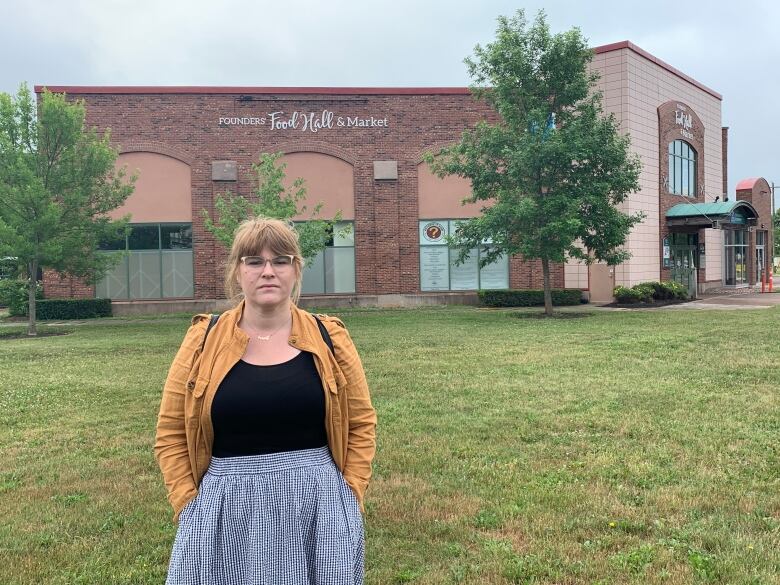Federal rent program falling short for Island businesses, says Charlottetown MP
'The federal program is voluntary and that's one of the biggest flaws'

The Canada Emergency Commercial Rent Assistance (CECRA) program is not working for some Island businesses that have been evicted during the COVID-19 pandemic, says Charlottetown MP Sean Casey.
He says there are flaws in the federal program and he has been hearing from small business tenants in the city.
"There is no question that because the program is voluntary and not all landlords have chosen to participate that there has been a negative impact," Casey said, adding he thinks some tenants are being treated unfairly.
CECRA offers forgivable loans to eligible commercial property owners covering a minimum of 50 per cent of the rent tenants owe.
In exchange, the landlord must reduce small business tenants rent by at least 75 per cent for a three-month period.

A Charlottetown business owner was surprised to find out they had been evicted because an application for the federal aid was filled out wrong.
"When we arrived on Friday morning at 7:30 our key cards no longer worked," said Paige Hart, the owner and operator of Holy Fox, a food vendor that until recently operated out of Founders' Food Hall and Market.
She said the location was shut down on March 15 due to COVID-19 and reopened June 26 but reopening didn't last long.
'A little shocking'
Hart said through the shutdown the landlord, Port Charlottetown, applied for CECRA and tenants were given a break on rent for March, April and June.
She said she believed her landlord was going to reapply to have the next three months covered because she was asked to fill out a CECRA application and submit it to them.
I would just like to see more for the very small business. Paige Hart, Holy Fox
"When we had reopened June 26the lady responsible for vendors, she came around and she informed us we had filled out the applications incorrectly," she said.
In an email to CBC, a representative with Port Charlottetown said, "We do not comment on tenant matters."

She was not able to pay the full month's rentand was told to be out by Wednesday.
"It was a little shocking on their part," she said.
Hart said a challenge with the CECRA program is business owners don't submit applications directly landlords apply for funding from the federal government on behalf of business owners.
"I would like to see it also incorporate more of the tenants as well because it greatly affects them," Hart said.
"I would just like to see more for the very small business," she said, adding her business is too small to take advantage of most loan programs.
Provincial jurisdiction
Hart said she contacted Casey for help.
When the federal government decided to offer help to small business tenants it entered negotiations with provinces, Casey said, since "landlord-tenant relations are exclusively the jurisdiction of the province."
I think there certainly are incidents where there has been some oppressive conduct on the part of landlords. Charlottetown MP Sean Casey
Casey said Ottawa failed to get all provinces on board with a national program, which provinces would be able to enforce, and the only route to creating theprogram was through a federal entity, in this case the Canada Mortgage and Housing Corporation.
"The result of that was that the program was voluntary because only the province had the power to make any landlord-tenant program mandatory," he said. "The federal program is voluntary and that's one of the biggest flaws."
Casey said landlords who don't want to participate or don't want to fill out the nine-page application don't have to.
The MP saidthe province could do more to help. He said he spoke to a constituent who told him if he was in Ontario, he wouldn't have been evicted because the province enacted a ban on evicting small businesses during the pandemic.
"He would have had some protections that were not afforded to him in Prince Edward Island," Casey said.
"I think there certainly are incidents where there has been some oppressive conduct on the part of landlords."
Casey said he also heard positive stories of landlords on the Island who have not participated in the federal program but have offered help to tenants who are renting from them.
'Government did not enforce anything'
That is a problem another business owner on the Island had identified with the program as well.
Osama Abdohmoved to the Island in 2016 and started an automotive shop called Mechanical Performance MP Auto Service. Hethought the program was mandatory for landlords.

He said his former landlordis based in Toronto and didn't apply for the CECRA program and he was expected to pay rent for three months when he couldn't,hisbusiness was evicted.
CBC P.E.I. attempted to contact Abdoh's former landlordbut did not hear back.
Abdohsaid the provincial government could do more to help.
"P.E.I. government did not enforce anything of commercial rent eviction to prevent it during the pandemic," he said.
If that was in Toronto I would not have faced any of this. Osama Abdoh, business owner
Abdoh said he spoke to a provincial government representative who tried to help, but the eviction was a legal issue and nothing could be done.
"All I am asking the government is act the same way other provinces do," he said.
"If that was in Toronto I would not have faced any of this."
Adboh said the CECRA program alone isn't enough and isn't consistent. He also ownsKettle Black, a coffee shopin Charlottetown, and said landlords for that location have taken part in the program.
Adbohalso spoke with Caseyand contacted the province.
In an email, representatives with P.E.I.'s Department of Economic Development said the province is encouraging landlords and Island businesses to work together to get through the pandemic.
The email also said the province is offering the emergency working capital loan program to businesses as a supplementary measure.
Hart said her business doesn't qualify for that loan program and she would like to see more help offered to small businesses.












_(720p).jpg)


 OFFICIAL HD MUSIC VIDEO.jpg)
.jpg)



























































































